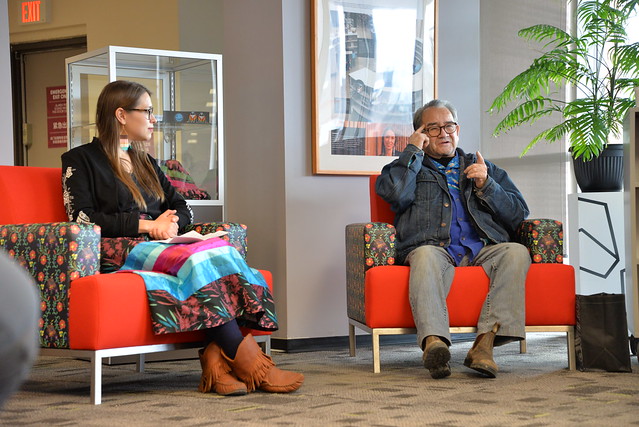
A new Indigenous collection featuring books, clothing, jewelry, chairs and more has opened at Kwantlen Polytechnic University (KPU)’s Richmond campus library. The χʷəχʷéy̓əm Indigenous Collection was curated by Rachel Chong, Indigenous engagement and subject liaison librarian.
χʷəχʷéy̓əm means oral storytelling in the hən̓q̓əmin̓əm̓ language spoken by the Kwantlen First Nation. While physical books by Indigenous authors are part of the collection, there are plans for oral storytelling recordings by KPU Elder in Residence Lekeyten and others to be accessible through a QR code in the future.
“This is important in bringing orality to the space – as ‘oral storytelling’ is the name gifted to the space,” says Chong, who is from the Métis nation. The name was gifted by Sesmelot (Fern Gabriel) from Kwantlen First Nation.
Richmond is the second campus at KPU to add an Indigenous collection after the first opened at its Surrey campus last year. The collections are part of efforts towards Indigenization at the university.
Each collection has a theme focussed on programs taught on that campus. At Richmond, the focus is on the Wilson School of Design. Alongside books with some connection to design, the collection features glass cases displaying jewelry and clothing. Other features include a circular space which is meant to reduce hierarchy and encourage more interaction between participants.
Métis artist Jennifer Lamont, a graduate of the Wilson School of Design and now coordinator of Indigenous student transitions and engagement at the university, created a fabric design on chairs that will be a part of the Indigenous collection spaces at all KPU libraries. The design features a powwow dancer print on the arm rests.
Also on temporary display at Richmond is an eye-catching dress designed by Lamont. The dress brings awareness of murdered and missing Indigenous women as symbolized by the use of hand patterns and its red colour.
“I hope KPU and the wider community is inspired to learn more about Indigenous peoples, histories, cultures, and languages. I also hope those communities takes that learning and transform it into reconciliatory action,” adds Chong.
